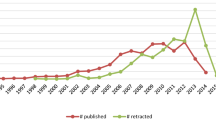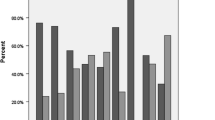Abstract
This research delves into the phenomenon of citation errors in academia, focusing on a specific case where renowned behavioural economist George Loewenstein incorrectly attributed a quote to William Stanley Jevons instead of his son Herbert Stanley Jevons. This unique setting serves as a “radioactive tracer” to investigate the presence of intentional laziness in academic practices, as opposed to unintentional errors. We find that research citing Loewenstein’s paper were significantly more likely to make the same mistake than papers that did not. On the other hand, others citing a subsequent paper by Loewenstein—in which he rectified the error—are not subject to those mistakes. Moreover, those who cited additional works by Jevons, regardless of whether they were authored by William S. or Herbert S., were less likely to commit the error. Additionally, scholars who obtained their PhD from higher-ranked institutions were less likely to make the mistake. Interestingly, papers with female authors were less likely to make such a mistake.
Similar content being viewed by others
Notes
Loewenstein (2008): “Publishing a collection of one’s own past work is a bit like attending one’s own late birthday or funeral. Although there is a natural tendency to not judge one’s own life and works as critically as one judges others’, it is difficult to completely turn off critical faculties that have been honed over one’s entire academic career, in contentious academic seminars, referee reports, and grading student work. When all of your training has turned you into the neural equivalent of an attacking dog, even one’s own tail becomes an attractive target. It is therefore with some squeamishness that I offer these papers for public perusal. Perhaps in part out of insecurity about the quality of the papers themselves, I have preceded each with some informal comments intended to provide a flavor of when, how, and why I wrote the paper and, more importantly, a sense of the eccentricities and endearing qualities of some of the researchers I have had the good fortune to work with” (xi).
“Stigler was never much of a friend to behavioral economics. A few years earlier, he had been invited to give the dinner address at a 2-day conference on psychology and economics, and the gist of his speech was that psychology had not yet had, and was unlikely to have in the future, much of an influence on economics. So, I suspected that Stigler wouldn’t be particularly sympathetic toward the paper’s message. But I sent it to him anyway, asking for comments” (Loewenstein, 2008, p. 386).
Serenko et al. (2021) also discuss other potential drivers of citation plagiarism, such as time pressure from the ‘publish-or-perish’ environment and the biased presumption of the correctness of previously published work, leading to the uncritical adoption of secondary citations.
It seems unlikely that Loewenstein (1987) plagiarized from Kohn (1984) as the contexts of the citations in both papers are markedly different. In Kohn’s work, the discussion on Jevons is quite limited and focuses on a different aspect, also referencing another work by William Stanley Jevons. On the other hand, Loewenstein (1987) delves more deeply into Jevons’ concepts related to intertemporal trade-offs and ‘anticipal pleasure’, which are not the focus in Kohn’s discussion.
We also check whether the effect of citing L1987 on incorrect reference is stronger for documents with in-text citations of L1987 and Jevons in the same sentence (n = 22), compared to those that have the citations further apart. However, we did not find a significant difference in the likelihood of referencing Jevons incorrectly between the two scenarios.
When we include an interaction term between L1987 and FLOD2002 in the model, we find that the likelihood of committing an incorrect citation is higher for documents who referenced both FLOD2002 and L1987 compared to those referencing only FLOD2002, however this difference is not statistically significant.
16 (and 5) documents have cited other works in the sample with the wrong (and correct) Jevons reference, and 1 document has cited other works including either. Whilst the effects did not reach 10% statistical significance level in the main results, the estimated coefficients are of the expected signs. Moreover, robustness checks via clustering the standard errors to account for documents written by common authors (Table 2) indicates the positive effect (on err rate) of citing other works that also incorrectly reference Jevons (1905a, 1905b) is statistically significant at 10% level.
Including share of female returns the same result albeit with slightly lower statistical significance (at 10% level).
We obtain similar results when substituting minimum academic age with average or maximum or with academic age defined as the duration between author’s PhD award year and publication year.
Notably, the effect is most statistically significant when using maximum PhD ranking, compared to average or minimum ranking (in the order). We also obtain similar results when using rankings from PhDEcon.net.
One could think of a collaboration network between the authors of the 82 documents with individual authors as nodes and coauthorship as edges. Each level of cluster thus represents an isolated network (non-connected graph) with no shared nodes and edges.
References
Abt, H. (1992). What fraction of literature references are incorrect? Publications of the Astronomical Society of the Pacific, 104, 235–236.
Amir, R., & Knauff, M. (2008). Ranking economics departments worldwide on the basis of PhD placement. Review of Economics and Statistics, 90(1), 185–190.
Bickley, S. J., Chan, H. F., & Torgler, B. (2022). Artificial intelligence in the field of economics. Scientometrics, 127, 2055–2084.
Broadus, R. N. (1983). An investigation of the validity of bibliographic citations. Journal of the American Society for Information Science, 34(2), 132–135.
Chan, H. F., Bodiuzzman, S. M., & Torgler, B. (2020). The power of social cues in the battle for attention: Evidence from an online platform for scholarly commentary. Journal of Informetrics, 14, 101077.
Chan, H. F., Guillot, M., Page, L., & Torgler, B. (2015). The inner quality of an article: Will time tell? Scientometrics, 104, 19–41.
Davies, K. (2012). Reference accuracy in library and information science journals. Aslib Proceedings: New Information Perspectives, 64(4), 373–387.
Devons, E. (1961). Essays in economics. Allen & Unwin.
Downing, K., Chan, S. W., Downing, W. K., Kwong, T., & Lam, T. F. (2008). Measuring gender differences in cognitive functioning. Multicultural Education & Technology Journal, 2, 4–18.
Frederick, S., Loewenstein, G., & O’Donoghue, T. (2002). Time discounting and time preference: A critical review. Journal of Economic Literature, 40(2), 351–401.
Harzing, A. W. (2002). Are our referencing errors undermining our scholarship and credibility? The case of expatriate failure rates. Journal of Organizational Behavior, 23, 127–148.
Jevons, W. S. (1871). The theory of political economy. Macmillan.
Jevons, H. S. (1905a). Essays on economics. MacMillan and Co.
Jevons, W. S. (1905b). The principles of economics. Augustus M. Kelley.
Kohn, R. E. (1984). Total satiation and competitive equilibrium. South African Journal of Economics, 52(1), 47–50.
Kotiaho, J. S., Tomkins, J. L., & Simmons, L. W. (1999). Unfamiliar citations breed mistakes. Nature, 400(6742), 307–307.
Larsson, K. S. (1995). The dissemination of false data through inadequate citation. Journal of Internal Medicine, 238, 445–450.
Loewenstein, G. (1986). The economics of intertemporal choice: A critical history. Center for Decision Research, The University of Chicago.
Loewenstein, G. (1987). Anticipation and the valuation of delayed consumption. Economic Journal, 97, 666–684.
Loewenstein, G. (2008). Exotic preferences: Behavioral economics and human motivation. Oxford University Press.
Moed, H. F., & Vriens, M. (1989). Possible inaccuracies occurring in citation analysis. Journal of Information Science, 15(2), 95–107.
Oppenheim, C., & Renn, S. P. (1978). Highly cited old papers and the reasons why they continue to be cited. Journal of the American Society for Information Science, 29, 225–231.
Rekdal, O. B. (2014). Academic citation practice: A sinking sheep? Portal: Libraries and the Academy, 14(4), 567–585.
Serenko, A., Dumay, J., Hsiao, P.-C.K., & Choo, C. W. (2021). Do they practice what they preach? The presence of problematic citations in business ethics research. Journal of Documentation, 77(6), 1304–1320.
Simkin, M. V., & Roychowdhury, V. P. (2003). Read before you cite! Complex Systems, 14, 269–274.
Todd, P. A., & Ladle, R. J. (2008). Hidden dangers of a ‘citation culture.’ Ethics in Science and Environmental Politics, 8, 13–16.
Todd, P. A., Yeo, D. C. J., Li, D., & Ladle, R. J. (2007). Citing practices in ecology: Can we believe our own words? Oikos, 116(9), 1599–1601.
Torgler, B., & Piatti, M. (2013). A century of American economic review: Insights on critical factors: in Journal Publishing. Palgrave Macmillan.
Zasa, M. (2015). The accuracy of references in five sport science journals. Science & Sports, 30(1), 31–33.
Acknowledgements
This study was supported by the Australian Research Council (ARC), DP180101169. We would like to thank the reviewer for the thoughtful suggestions provided.
Author information
Authors and Affiliations
Corresponding author
Ethics declarations
Conflict of interest
All authors declare that they have no conflict of interest to disclose.
Additional information
Publisher's Note
Springer Nature remains neutral with regard to jurisdictional claims in published maps and institutional affiliations.
Appendix
Appendix
See Table 2.
Rights and permissions
Springer Nature or its licensor (e.g. a society or other partner) holds exclusive rights to this article under a publishing agreement with the author(s) or other rightsholder(s); author self-archiving of the accepted manuscript version of this article is solely governed by the terms of such publishing agreement and applicable law.
About this article
Cite this article
Chan, H.F., Hugo, E. & Torgler, B. Tracking a “radioactive tracer”: laziness in academia. Scientometrics 129, 431–443 (2024). https://doi.org/10.1007/s11192-023-04908-x
Received:
Accepted:
Published:
Issue Date:
DOI: https://doi.org/10.1007/s11192-023-04908-x




